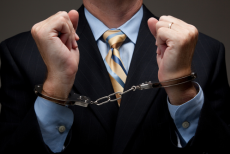
Edwin Sutherland described ‘white collar’ crime as a "crime committed by a person of respectability and high social status in the course of his occupation". He believed that the majority of criminologists were wrong in thinking that crime stemmed from poverty and social disorganisation, and that crime was just as common in the higher classes, but was just less likely to be punished. Since those in power make the law, they are far better at avoiding being persecuted themselves. Radical criminologists have suggested alongside Sutherland’s ideas, that rather than just looking at the sorts of crimes that are generally punished by the law, criminology should attempt to study all forms of social harm against individuals or society.
There are two main types of white collar crime that are discussed. These are termed corporate crime and occupational crime. The former describes those crimes that are committed by businesses as a whole, such as scamming or fraud, whilst the latter describes crimes that are committed by individuals within a company, often against the organisation itself, such as in the case of stealing office supplies, or not keeping to health and safety regulations. The term white collar crime is also seen as the opposite to blue-collar crime, which refers to crimes generally committed by those in the lower classes of society, such as car theft, robbery and vandalism.
Sutherland believed that there were currently no explanations which could yet explain crime within the upper classes, and so developed his own theory for these crimes. Differential Association theory is based mainly on how an individual learns to commit crime, and makes sense of both white and blue collar crime. It says that if an individual is exposed more to people that believe crime is good than those that believe crime is bad, they will then take the view that crime is acceptable and commit it themselves. Sutherland believed that this applied to crime in offices and workplaces, since new employees would learn the techniques for crime and the attitudes that promote crime from older employees, and any people that did not agree with crime in the workplace or would not agree to take part would be fired, and so could not influence the decisions of any new employees.
Others have suggested that this crime could be caused by the strain from competing companies, and that in order to keep up with this strain, all companies would be forced to adopt the same illegal methods. Also, there may be a business subculture that emerges, whereby individuals can achieve status by committing the crimes, since there has been reported boasting in workplaces about the use of criminal tactics to earn large amounts of money. It may be that in this case the crime itself becomes just as much of a goal as the money, since it achieves power for the individual.
Whichever theory you believe is correct it stands that we, as a society, must seek to stop white-collar crime since currently the rules are unfair. For a crime like actual theft, an individual may be punished for 5 years in prison for stealing £5000, yet, big businesses may scam people out of millions and millions of pounds and when they are caught, which they are often not, receive less imprisonment time. Also, because of failed checks by cruise liner companies and factories, big disasters have happened that have killed hundreds, yet because we cannot pin the blame on anyone, those responsible get off unpunished. This is certainly a serious issue, and to make the law fairer society must first start to take white collar crime more seriously as a major problem.
Image from: http://www.atkinsandmarkoff.com//wp-content/uploads/2014/05/white-color-crime-oklahoma-city-attorney.jpg

0 Comment:
Be the first one to comment on this article.